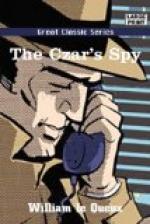The woman told me that she distinctly heard Miss Muriel sobbing, while her father walked up and down the room speaking rapidly in a low tone. Then he came out again and returned to his dressing-room, while Miss Muriel presumably changed from her evening-gown into a dark traveling-dress.
“Did she say anything to you?” I inquired.
“Only that they were called away suddenly, sir. But,” the domestic added, “the young lady was very pale and agitated, and we all knew that something terrible had happened. Mrs. Leithcourt gave orders that nothing was to be told to the guests, who dined alone, believing that their host and hostess had gone down to the village to see an old man who was dying. That was the story we told them, sir.”
“And in the meantime the Leithcourts were in the express going to Carlisle?”
“Yes, sir. They say in Dumfries that the police telegraphed after them, but they had reached Carlisle and evidently changed there, and so got away.”
By the administration of a judicious tip I was allowed to go up to Miss Muriel’s room, an elegantly furnished little chamber in the front of the fine old place, with a deep old-fashioned window commanding a magnificent view across the broad Nithsdale.
The room had been tidied by the maids, but allowed to remain just as she had left it. I advanced to the window, in which was set the large dressing-table with its big swing-mirror and silver-topped bottles, and on gazing out saw, to my surprise, it was the only window which gave a view of that corner of Rannoch Wood where the double tragedy had taken place. Indeed, any person standing at the spot would have a clear view of that one distant window while out of sight of all the rest. A light might be placed there at night as signal, for instance; or by day a towel might be hung from the window as though to dry and yet could be plainly seen at that distance.
Another object in the room also attracted my attention—a pair of long field-glasses. Had she used these to keep watch upon that spot?
I took them up and focused them upon the boundary of the wood, finding that I could distinguish everything quite plainly.
“That’s where they found the man who was murdered,” explained the servant, who still stood in the doorway.
“I know,” I replied. “I was just trying the glasses.” Then I put them down, and on turning saw upon the mantelshelf a small, bright-red candleshade, which I took in my hand. It was made, I found, to fit upon the electric table-lamp.
“Miss Muriel was very fond of a red light,” explained the young woman; and as I held it I wondered if that light had ever been placed upon the toilet-table and the blind drawn up—whether it had ever been used as a warning of danger?
As I expressed a desire to see the young lady’s boudoir, the maid Cameron took me down to the luxurious little room where, the first moment I entered, one fact struck me as peculiar. The picture of Elma Heath was no longer there. The photograph had been taken from its frame, and in its place was the portrait of a broad-browed, full-bearded man in a foreign military uniform—a picture that, being soiled and faded, had evidently been placed there to fill the empty frame.




